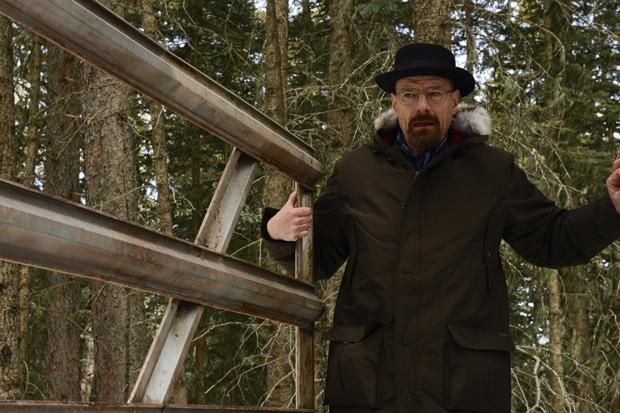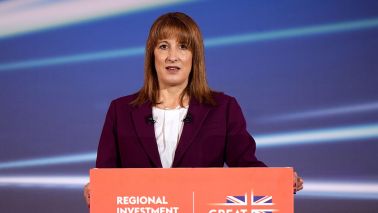It has been the social-science equivalent to the Large Hadron Collider, the most expensive and most awe-inspiring experiment of our time. Like Cern’s particle collider, it started in 2008 and this week, just six months after the Geneva researchers confirmed that they had found the Higgs Boson, it, too, has reached a conclusion. Walter White (above), hero of Vince Gilligan’s Breaking Bad, is…(spoiler averted).
When Breaking Bad hit our screens, it dumbfounded viewers and critics alike with the sheer complexity of its narrative and aesthetics. The reviews were mixed and its future uncertain. The social experiment that the series set out to explore was strikingly simple: take an ordinary, law-abiding citizen and have him dabble in crime. Walter White Sr, a failed chemical scientist-cum-high school teacher, who works after hours at a car-wash plant to make ends meet, is diagnosed with advanced lung cancer. Facing death and foreclosure on his family home, he goes into partnership with his former pupil-cum-minor drug dealer Jesse Pinkman. As a gifted chemist, Walt will cook crystal meth of unprecedented quality and Jesse will sell it. Just enough to make sure that Walt’s family, his newly pregnant wife and his teenage son, who suffers from cerebral palsy, will be able to survive once he is in his grave.
It sounds reasonable enough, doesn’t it? Well, it does to a modern-day economist. Changes in circumstance (the prospect of premature death) give rise to changes in lifetime income (no salary for the deceased) as well as relative prices for different goods and services (no punishment for the condemned). A small change in consumption and occupational choice are exactly what is called for. After all, life is all about trade-offs and when variables change some fine-tuning is needed. Simple graphs drawn on blackboards in every introductory class to microeconomics demonstrate the innocuousness and indeed rationality of Walter White’s choice.
But then it all goes wrong. Walter’s cancer goes into remission in season two, and whereas his old self (the one that made thoughtful lists about the pros and cons of killing an adversary before proceeding) would have changed course at this point, his new incarnation punches his mirror image in the face when the happy news arrives.
In the process of trading off morality against self-interest a peculiar thing has happened to Walter. Something has been destroyed. Roger Scruton, the British philosopher, writes in his enlightening treatise on Richard Wagner’s Tristan und Isolde: ‘We are tempted to live by rational self-interest, judging everything — the sexual act included — in terms of cost and benefit. Homo economicus, who exchanges duty for pleasure and value for price, seems to us to have freed himself from guilt. But if he has done so, we recognise, it is because he has freed himself also from love.’
And so has Walter White. While his initial choice was justified by love for his family, he now embarks on a course that will destroy the very essence of this love. For those who harboured hope for Walt and his wife Skyler, it all comes crashing down in episode 14 of the final season. The two of them roll on the floor; between them, shockingly erect, is a knife.
It is a Wagnerian plot that the show’s creator Vince Gilligan confronts us with. Love and morality cannot be straightforwardly traded for power and wealth. We have seen this before, but Gilligan makes it visceral and shockingly real. He explores a range of emotion, from the deeply sad to the ultra comical using a kaleidoscope of visual styles, from grim realism to grotesque pop imagery. Sir Peter Jonas, former director of English National Opera and intendant of the Bavarian State Opera, calls Breaking Bad ‘the single most important aesthetic experience to be had today’.
When the mathematisation of academic economics began, its proponents introduced, for the sake of examples that could be illustrated in simple graphs, two assumptions: that all things could be split arbitrarily into small quantities and that preferences (i.e., tastes, judgments and convictions) were such that, when prices changed, one could always adjust choice just a little. Combining these assumptions with the doctrine that preferences never, ever change has led economists and most western politicians to the happy view that we can tinker with our existence without anything bad or dramatic ever happening.
This is, of course, what Walt thinks when he is confronted with his unfortunate cancer diagnosis. But some things simply cannot be divided and assuming that they can has catastrophic consequences — as at the beginning of episode 14, when Walt tries to negotiate a deal to save the life of his brother-in-law, DEA agent Hank Schrader. There is no compromise there.
Some commentators have alluded to Walter White’s increasing schizophrenia as the plot progresses whereby he is torn between his original goal to save his family and his subsequent delight in becoming a superbly successful criminal. But there is no need to invoke schizophrenia; it is much simpler than that. Once his morality is out of the window, Walt is left only with extremes. In between there are just lies and it is perhaps Walt’s worst foible that he excels at lying as no other.
Watching the Breaking Bad experiment takes some 50 hours. It is a ride that confronts us with the temptations and rewards of selfishness: Walt’s sheer joy at being alive again, which, for a brief time, even invigorates his marital sex life, and the promise of wealth that allows him to leave a drab existence behind. It is no wonder that large parts of the audience have been rooting for Walt until the very end and it would be foolish not to acknowledge this Nietzschean element of the story, which epitomises the American dream of rags to riches through entrepreneurial ruthlessness.
Just as the Large Hadron Collider found a discrete particle that lends mass to matter, Breaking Bad has identified a similarly discrete, unsplittable moral element that lends meaning to existence and fibre to society.







Comments